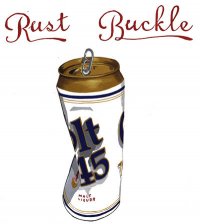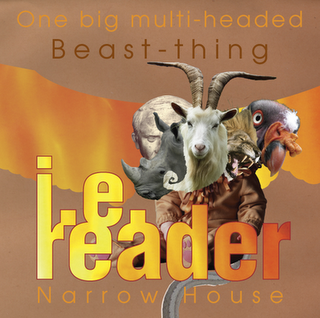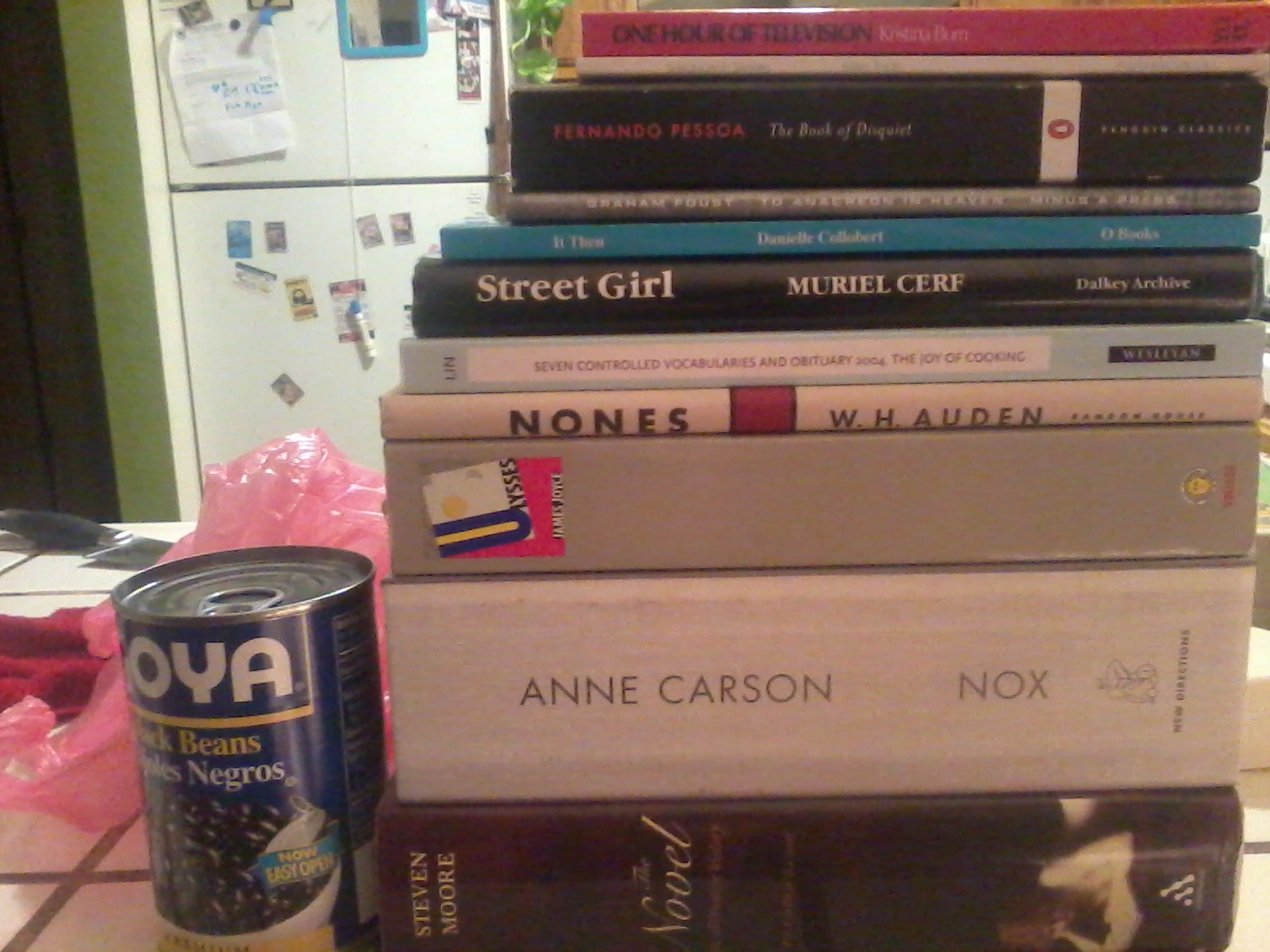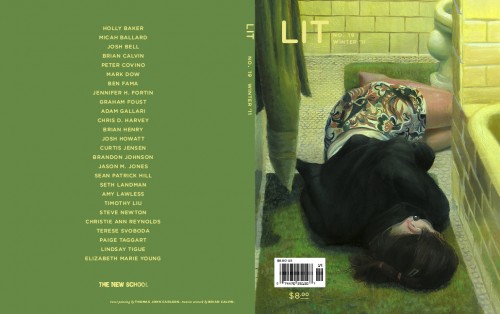Hill of Beans, Can of Words
These are some books I bought or otherwise acquired recently. A hill of words.
& that is a can of beans.
Ben Mirov
Ghost Machine
(not pictured)
Caketrain
Pittsburgh, PA — 2010
I read most of this book at the park that is in the book on a pretty much perfect day and it was a hell of a pairing I have to say. It has the kind of restraint my own work lacks a lot. Makes me jells but not bad way. Read the rest at my ex’s apartment who is no longer my ex while she made me dinner, which I could not believe was happening and yet there it was happening. I often felt breathless and thought maybe that’s not such a dumb name for a movie after all. READ MORE >
Touch Me How I Want to Be Touched

@grahamfoust responds like a human being to the Paris Review retroactive rejection on twitter: “I’m actually not that upset–they’re giving me fries with my kill fee, and the poems were all just shit I took from Google anyway.”
@ the Observer, Christian Lorentzen gives the most evenhanded coverage of the thing in full: Dead Poem Society.
But really, if we’re going to talk about this, which I guess people insist upon, here’s a question: as a writer do you feel entitled to careful handling?
Is this handling different, say, than the care you’d receive at McDonald’s? If it is different, how is it different? Because McDonald’s is a service you are buying, and selling writing is a service you are offering, shouldn’t the quality control be more on the McDonald’s end than the other?
If kill fees are common in all other art, including journalism, why should poems carry different weight? Even outside of art, why more than any other object? If I buy a table from Crate & Barrel, then decide I can’t use the table, for whatever reason, I take the table back no questions asked.
Why should art be given special treatment? Should it?
Am I wrong to return a book I don’t like to Borders after reading part of it? What if I read the whole thing? Have I consumed?
Furthermore, why are the most popular blog posts online always about topics such as rejection, submission, balance, all things that pertain wholly to the self? Are we a consolidation of 8 year olds, looking for fingerpainting time? Where is fanfare needed more?
Happy New York (Part I)
 I don’t think the Rust Buckle Books (more on these in Part II) bee
I don’t think the Rust Buckle Books (more on these in Part II) bee r can logo (below) is by Brian Calvin, but seeing it reminded me–via Flood Editions, where Calvin’s heads (Half-Mast, 2001, and Killer, 2006) can be found on Graham Foust’s Necessary Stranger (2007) and A Mouth in California–that “Head”, his show at Anton Kern, closes on January 16.
r can logo (below) is by Brian Calvin, but seeing it reminded me–via Flood Editions, where Calvin’s heads (Half-Mast, 2001, and Killer, 2006) can be found on Graham Foust’s Necessary Stranger (2007) and A Mouth in California–that “Head”, his show at Anton Kern, closes on January 16.
I’m sure New Yorkers themselves go elsewhere (where?), but “Goings On About Town” is still my first stop to find out what I get for living where else. Although there’s always an abundance in ART (the above BRIAN CALVIN, WALLACE BERMAN – Jan. 9; “FROTTAGE” – Jan. 17) and MOVIES (Tati–tonight, Trafic–at the MOMA: see also, under ART, OROZCO) that I wish I wasn’t missing, rarely does READINGS AND TALKS make me want to move.
Ever abbreviated (possibly defensible in print, but why all the white space online, where this week there were three total readings–no talks–compared to eight pages of movies?), the section is never more so than in its annual capsule announcement of the reading of the year:
A hundred and forty poets and performers, including Penny Arcade, Yoshiko Chuma, Steve Earle, John Giorno, Taylor Mead, Judith Malina, Jonas Mekas, Eileen Myles, and Genesis Breyer P-Orridge, gather for the thirty-sixth annual marathon reading at the Poetry Project.
What about the other 130 plus poets (from Ana Bozicevic to Magdalena Zurawski) and performers (Philip Glass) and performers (Ostashevsky)? Is there another reading anywhere that, thanks to the Project’s own Arlo Quint (and Emily XYZ) covers every letter? But I guess I shouldn’t quarrel with an alphabet that begins with Penny Arcade and ends with Genesis Breyer P-Orridge. Indeed I would have gone to hear the listed Ms alone: where else could you find Mead (who turned 85 on New Year’s Eve), Malina (b. 1926 in Germany, godmother of the American avante garde), the Lithuanian born Mekas (godfather of same, turned 87 on Christmas Eve), and Myles (the only Presidential candidate who’s written a speech about Robert Walser?), not to mention Machlin, Marinovich, (Chris) Martin, and Mesmer, among Many More (see list-in-progress, with links, after the leap), in one audience, let alone on one stage?
CAConrad, the poet of the year if ever there were one (when’s the last time anyone had books as good as Advanced Elvis Course and The Book of Frank come out in the same year?), has an anecdote about the most memorable line from the 2005 reading in the comments section of this to-be-revisited list. Can anyone give us some highlights from yesterday’s event? Will anything else in 2010 approach this gathering in sheer skylight? READ MORE >
I.E. Reader, second post: Graham Foust
 This morning I was reading Wallace Stegner’s novel Crossing to Safety (in the bathtub, for those who track this kind of thing), and was struck by a chapter about a dinner party of some young English professors at the University of Wisconsin in the early middle of the last century. There is a lot in that section to grab my attention, including the academic climate just after the depression (people still cared about Chaucer and Spencer like they mattered), the drinking habits just after prohibition (capable hosts couldn’t mix a Manhattan), and the social dynamic between husbands and wives who could read Homer in Greek, and who would stand around the piano and sing hymns after dinner then listening to Beethoven A-sides in the sitting room. What fun!
This morning I was reading Wallace Stegner’s novel Crossing to Safety (in the bathtub, for those who track this kind of thing), and was struck by a chapter about a dinner party of some young English professors at the University of Wisconsin in the early middle of the last century. There is a lot in that section to grab my attention, including the academic climate just after the depression (people still cared about Chaucer and Spencer like they mattered), the drinking habits just after prohibition (capable hosts couldn’t mix a Manhattan), and the social dynamic between husbands and wives who could read Homer in Greek, and who would stand around the piano and sing hymns after dinner then listening to Beethoven A-sides in the sitting room. What fun!
One striking moment came when Sid, the party’s host, read from a volume of Housman, and everyone knew he was leading things a bit, but they indulged him as he read “Easter Hymn.” Then they discussed it in terms of what it meant for understanding the rest of Housman’s work, how it seemed too Christian for the old guy, how the two stanzas seemed out of order — and I loved reading all that. It made me 10 minutes late for work. Then I wondered if it would be possible for a contemporary poet to revisit Housman. Certainly no one today ought to go back and emulate him directly — he’s too transparent, too wrought in scansion and sentimental in thought to be compelling nowadays — but is anyone who’s any good making an update?
Well, below the fold, check out Graham Foust’s poem in the I.E. Reader, which is so primarily ahead of the surveillance that I was jolted to read it. It’s so throwback: READ MORE >


